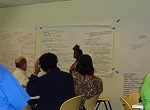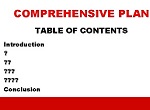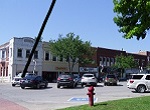Selecting and Supervising City Planning Consultants
Last Reviewed: July 6, 2025
Occasionally you may want to hire city planning consultants to help your neighborhood, city, district, or community organization make good real estate development, urban design, zoning overhaul, or economic development decisions.
Don't be insulted by the term city planning if you live in a small town; this is just what the discipline is called.

Many of you will object right away that you can't afford a consultant, and that may well be true. Often you become able to afford to hire consultants when your state or local government, or perhaps a private foundation, provides you with some grant funding. In fact, hiring a grant writer may be an important positive step if your neighborhood or community stands at a crossroads. If you need to write your own proposal, we have provided some hints on our community development grant narratives page.
Should You Hire a Consultant?
If you have the money, it's easy to say, "Let's do a study," when there is uncertainty about what to do. Keep in mind that your community still must make the final decisions, so make sure you aren't just stalling on the hard work of community compromise and decision making. You should really hire outside expertise only when you genuinely don't know what to do, or are worried that you won't be able to withstand legal scrutiny if program descriptions or ordinances aren't written in precise fashion.
Another common practice is hiring
consultants to validate what you already know and want. Our view is that this is fine,
by the way; just be honest with yourselves and with the consultant that this
is what you are doing. Outside expertise can help smooth the way if you face internal conflict or fierce opposition to a correct and appropriate course of action.
But then, it follows logically that if the consultant you hire surprises you with the final findings that your preference isn't the best or only choice, you will need to respect that. Consider carefully whether their advice is sound. Often consultants can't even predict what they will conclude until they have actually done the work on your behalf.
Another consideration is whether you have the capacity to properly supervise the consultant. You will need an elected or appointed official, or a dedicated volunteer in the case of a CDC or neighborhood association, who can spare the time and energy to share knowledge, experience, and existing background materials with the consultant. They will need access to your information, board members and other important players in your situation, and possibly other resources.
Looking over and commenting on the firm's interim work products and drafts also is an important task that really cannot be ignored if you are going to obtain full value for your consulting dollar. Make sure your contract allows you to review the work at one or more times before a final product is produced. You can't afford to let the work get out of hand so that in the end, you have spent your money, but you have a final report that is close to useless to you.
That doesn't mean that you ignore the project except at the designated review times. If you suspect that the work is lagging or that their interviews and conversations with people in your community are off topic, by all means communicate your concerns. If the consultant is good, you won't be the only client, and you have to respect that, but still, you will need to be assertive about moving your product forward.
Choosing City Planning Consultants
Unless you have accumulated your own money through fundraising or dues, it is possible that your government or philanthropic sponsor will want a major role in hiring your consultant. You may have little or no voice in that decision.
For example, a state program may hire one consultant to do similar work for a group of communities.
For those instances where you are allowed to choose who you want, or are considering whether to hire city planning consultants, you’ll want to request references, descriptions of previous projects, and resumes of the key individuals who will actually work on your project.
Then you'll want to interview the qualified city planning consultants, looking for chemistry, a compatible communication style, attitudes and biases toward your type of community, and fee structure. Here are some considerations:
1. Be sure you have a carefully considered picture of what your plan will try to achieve. You might want to read about neighborhood planning, or any of the many other pages on this site related to your topic.
Is this a broad plan for everything in the community? (If so, you'll need consultants who can cope with social and economic issues and change, as well as the physical layout of the community.) Is it narrowly focused? The answers to these questions determine whether you need a specialist, or whether you need a firm with broad experience.
2. Small is beautiful. In the case of planning consultants, usually the smaller, the better. In fact, a sole proprietor with no permanent employees can be a wonderful choice.
Having led a consulting firm at various levels of staffing, I can say from experience that as more employees are involved, the percentage of the effort that goes into coordination, false starts, and repetitive work increases greatly. The flip side of that is that a larger firm can provide a wider experience base and more specialized expertise.
But in general, if your neighborhood's issues are relatively common, a smaller firm or very small unit of a large firm will do a great job for you. In the interview process, though, make sure a sole proprietor has the capability for mapping, drawing, researching, interacting with the public and with key property owners, and anything else your project needs in addition to data collection, analysis, writing, and thinking.
3. Carefully evaluate how much access you will have to the firm's most experienced and talented personnel. Ask pointed questions about who you will actually see and work with. Many consulting firms send their best salesperson, not their best planner, to try to nab your business.
If the firm's office is out of town, be especially cautious. You don't want to pay the travel bills (you will), unless you need really specialized knowledge.
Many local firms may have a particularly personable marketing point person, but you want to know whether the planners, engineers, or graphic designers you'll be working with can communicate with you. In fact, I like to insist that the actual people you will be working with on a daily or weekly basis participate in the interview.
Consider that if the main contact or contacts travel often, you may have an access problem.
Be sure to ask what other projects the city planning consultants will be addressing during the same time frame as you expect. Ask about their record of completing projects on time; planning projects notoriously extend beyond the allocated schedule.
4. Evaluate the company's related experience. A planning, economic development, or market research consultant who has worked in your same neighborhood, city, or county almost inevitably can work more efficiently than someone new to your region.
If they already have some knowledge of your geography, they will save both time and money, and therefore provide you with more detail. And certainly the firm's expertise in specialties you need will save them time and you the money that goes with the time.
But weigh the time-saving and therefore money-saving value of local experience versus quality and expertise. The local firm that has worked in your area extensively may not be as imaginative as a new or out-of-town company.
5. Lastly, we shouldn't have to tell you this, but our advice is not to hire a novice or a "wanna be." If you even consider such a thing, ponder that a site visitor asked us how to become an urban planning consultant, maybe thinking that the answer would be two weeks of training like a telemarketer. A consultant needs full-time experience in planning or community development within a government or established consulting firm.
Managing City Planning Consultants After Hiring
Your funder may play a very significant role in supervising the project. In case you are so lucky as to be able to oversee the preparation of your plan yourself, though, here are a few tips.
1. Remember to insist on periodic updates. City planning consultants have some tendency to work with minimal consultation, because consultation takes time and often causes changes of direction that are expensive for the consultant.
However, from the community perspective, you want to know what they are thinking and why, whether they are on schedule or falling behind, the general conclusions they are drawing, and how and whether they are talking with the right players.
2. Draw clear lines of responsibility about who will present the ideas to the general public, and when. Determine whether they are allowed to talk about your planning project on social media during the process, and if so, at what milestones.
Your organization's community engagement style will determine whether you allow your membership or the general public to see the development of the ideas early and often.
Your own organizational culture will dictate whether you present a finished product at the end and allow people a perfunctory opportunity to comment, or whether you set up two or three turning points in the project when public input will be allowed.
3. Communicate very clearly with your city planning consultants when you can see that they are leaning toward solutions that are politically unacceptable to you, local government leadership, or the community at large.
Political considerations are as valid as physical constraints, and sometimes you will have to be very firm to deter designers who have fallen in love with a concept.
4. Insist on practicality. If a plan can't be implemented, it's not worthwhile. If solutions are well beyond your budget and no feasible fundraising methods are proposed, you don't really have a plan.
When your plan requires permission of state government and it becomes clear that such permission won't be granted, again, you don't have a plan. Of course you should have set the stage for this conversation early in selecting your city planning consultants, but it's never too late to say the product isn't acceptable because it's not do-able.
An exception is when the consultant has done everything right to involve the permission-giver early, and yet there is a change of direction. Then you owe the fee to the consultant.
5. Devote some serious effort to writing a good description of the work to be performed. Hopefully this discussion has given you some insight into the many things that could go wrong when you hire city planning consultants. Don't run out of money before you have the product that you need.
Be very clear in the work write-up (often called a scope of services, scope of work, or work plan) that you are seeking a plan that can be carried out, and that you need to have the plan spell out the next steps you need to take to make the plan a reality.
6. Become an informed and involved supervisor. Obtain an overview of the most important issues facing your neighborhood or community. Browse through our Sitemap to see if we provide a short review of those topics.
You can improve the performance of planning consultants by asking them challenging questions, probing their assumptions, and making it clear that you're attempting to become more knowledgeable and realistic about your major question marks.
7. Consider how you can save money. You may be able to help with information gathering and community meetings, saving significant money.
Your local government may be able to contribute mapping and data free; make sure your city planning consultants are taking advantage of what public and private entities in your community will provide at no cost. If possible, do some legwork for them. Focus your consulting money on judgments, drawings, mapping, and other tasks you cannot do for yourselves.
Computer applications for mapping
(called geographic information systems, or GIS for short) are now available to the general public, so make sure that you don't hire a consultant just to produce a map that a geeky member of your community organization would love to produce.
But the advice of a seasoned professional can save frustration and countless dollars, if you select and supervise wisely.
Other Interesting Pages:
- Making and Keeping a Good Community >
- Community Organizations > City Planning Consultants
Join GOOD COMMUNITY PLUS, which provides you monthly with short features or tips about timely topics for neighborhoods, towns and cities, community organizations, and rural or small town environments. Unsubscribe any time. Give it a try.




